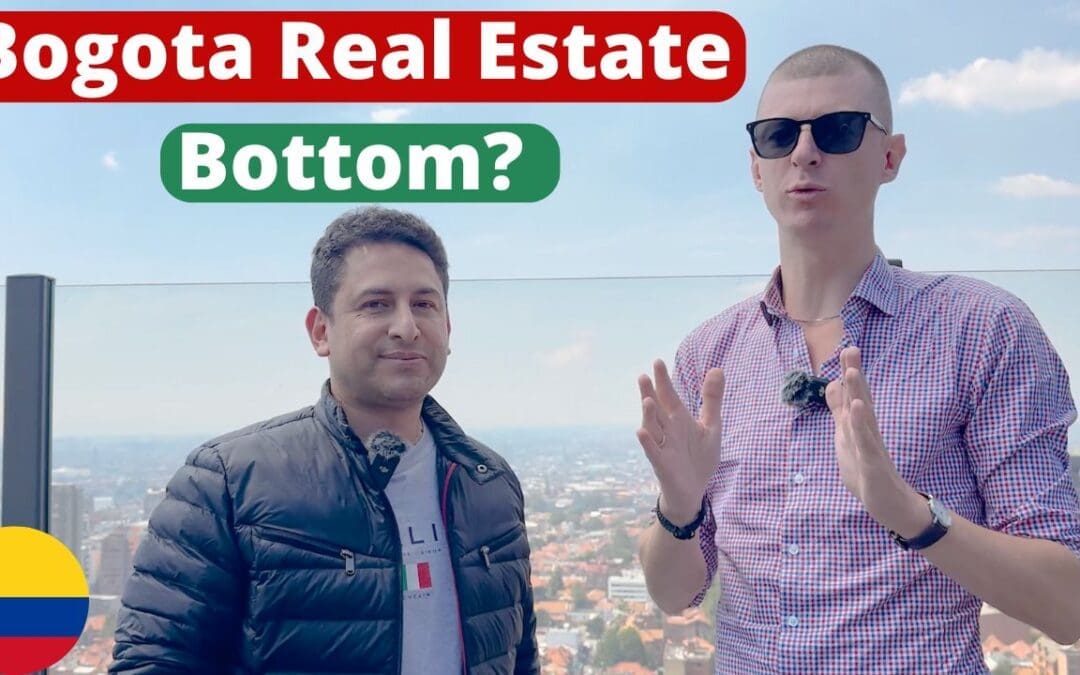I am already quite heavy Colombia in terms of exposure. I invested in a penthouse in Medellin, and own a lot of Colombian stocks. Why?
Colombian assets are some of the cheapest in Latin America due to the perceived risk which I believe is over-estimated. To be clear, it is not risk-free at all. I just see a gap between perceived risk and actual risk, which I seek to exploit until I see a reevaluation.
Bogota was never too interesting from a real estate point of view. People who invested there in the past 10 years generally lost money in USD. However I believe that the market has potentially bottomed.
Additionally, I see some new trends emerging that could be exploited to try to get high rental yields, which were previously very hard to get in Bogota, unlike in Medellin.
I discussed the state of the real estate market in Bogota with Arcesio.
- I wrote a whole article on the real estate market in Bogota
- You can get in touch with Colombian, but American-educated, Bogota realtor Arcesio.
All the best from Buenos Aires, where I have been exploring the market for the past few weeks.
To a World of Opportunities,
The Wandering Investor.
Other articles on Colombia:
- Making a Real Estate Investment in Medellin, Colombia – unusually high yields
- Making a Real Estate Investment in Cali, Colombia – the next frontier?
- Actual Capitalization Rates / Rental yields in Medellin
- Penthouse Investing with High Yields in Medellin
- $100,000 investment house in Medellin, Colombia
- Is Colombian real estate still investable following the election of Gustavo Petro?
- Double-digit yields in Bogota for Airbnb multifamily units
- 12% net capitalization rate and rental yield in Cali, Colombia
- Afternoon trip to a Finca for sale near Medellin – with ROI numbers
- Pros and Cons of living in Medellin, Colombia
Other services in Colombia:
- My favourite real estate agent in Bogota
- Real Estate Lawyer in Colombia
- How to obtain residency in Colombia
- My favourite real estate agent in Medellin
If you want to read more such articles on other real estate markets in the world, go to the bottom of my International Real Estate Services page.
Subscribe to the PRIVATE LIST below to not miss out on future investment posts, and follow me on Instagram, X, LinkedIn, Telegram, Youtube, Facebook, Rumble, and Odysee.
My favourite brokerage to invest in international stocks is IB. To find out more about this low-fee option with access to plenty of markets, click here.
If you want to discuss your internationalization and diversification plans, book a consulting session or send me an email.
Transcript of “Investing in Bogota real estate – Possible bottom? Market update”
LADISLAS MAURICE: Hello, everyone. Ladislas Maurice from thewanderinginvestor.com. Today, I’m in Bogota with my realtor, Arcesio. Arcesio, how are you?
ARCESIO: Hi, Ladislas. How are you? It’s good to have you back in Bogota. It’s been a while.
LADISLAS MAURICE: Yeah. Always a pleasure. Today, we’ll be doing a quick market update on real estate here in Bogota. We’ll be discussing residential as well as commercial, and we’ll be comparing Bogota to other capital cities in Latin America.
Update on Bogota real estate market
LADISLAS MAURICE: Arcesio, can you give us a little bit of an update on the Bogota real estate market?
ARCESIO: Yes, Ladislas. Let me tell you a little bit about what’s happening in the last 10 years with the residential market. We see the value in pesos, it has roughly doubled. If we see it in dollars, it has roughly remained flat.
LADISLAS MAURICE: I think this is really a core insight. The prices, really, in dollar terms haven’t budged for the past decade. And we’re talking of a big, big capital city in Latin America. And what’s been happening recently in the market?
Impact of elections
ARCESIO: Well, we had elections almost a year-and-a-half ago, and this is the first time that Colombia has a far-left president. He’s trying to do a lot of new policies and a lot of changes. Many foreign and local investors, especially the big ones, have been a little bit hesitant to invest in Colombia, so foreign investment has decreased. That’s a fact. And locals, they have money, some of them invest outside, but there is still a lot of money that is ready to come out. Basically, what’s happening and what’s been in articles all over the world is that most of the policies seem to be stopped by the Congress. And as that happens, there is more investor confidence, because it seems that the government is not going to get what they want, even though they had some policies that had hurt certain sectors.
But still, local elections recently, around three months ago, in the major cities were won by center right and right governments, which are very business friendly, and they give a lot of confidence. After that, it seems investors are going to start deploying some money. It looks more optimistic in that sense.
LADISLAS MAURICE: Yeah, because recently there were the municipal elections, and the pro-business parties essentially won everything, almost.
ARCESIO: Almost everything, yeah. I think, like, around two-thirds of the country. The most important cities, I will say, are in good hands right now.
LADISLAS MAURICE: Cool. You’re starting to see things pick up a bit?
State of residential real estate
ARCESIO: In different type of asset classes. For example, if we go back to residential, the sector has been hit strongly. First, some by some policies of the government in low income housing, but if we’re talking about mid-range and up housing, the sales have been down around 32.3%, according to official sources.
LADISLAS MAURICE: That’s huge.
ARCESIO: It’s very, very big, but it’s not just only the government, it’s been also we have high interest rates, we have high inflation, so that has affected a lot, and investor trust has been also an issue. The good thing is that inflation is still, for the last year, 2023, closing 9.28%, but it seems that it’s going to start coming down. Also, well, the interest rates are coming down again. As an example, if you want to get a mortgage, you could go to 18% per year. It’s extremely high. The market in residential, it seems to be bottoming or coming close to a bottom. There may be many opportunities also because even new projects were not closing financially, because the banks were measuring risk, were not lending money, so some projects need money, so there are many, many variables that have affected. Maybe you can go in and look for good opportunities, in that sense.
A buyer’s market
LADISLAS MAURICE: Look, when I compare Medellin and I compare Bogota, personally, I invested in Medellin. But when you go around Bogota, I see a lot of For Sale signs all over the city, even in the nice neighborhoods. I know of people that have been trying to buy here, and the sellers are very keen to sell, so it’s definitely a buyer’s market. And I think, look, I’m going to put this graph here on the screen, but this here is really interesting from Bloomberg. It’s a study done by a university. Look, these numbers are not perfect, because they never are, but overall, the general idea that one gets from this is that Bogota is pretty much the cheapest capital city in Latin America. Here it says $1,000 per square meter. Obviously, that takes into account all the poor neighborhoods. Let’s say we go for a good neighborhood in Chapinero, we’d be looking at, what, $1,500 to $3,000 to $4,000 depending on the buildings?
ARCESIO: Yeah, something like that, it depends on the building. And also dollar has fluctuated a lot in the past. I mean, once the government started, we went almost to $1 to 5,000 pesos. Now the peso has appreciated, we can go to $1 for 4,000 pesos, around that, which shows a good sign on the economy, on the investor trust. Basically, that’s a good sign.
Purchase and renovation costs per meter
LADISLAS MAURICE: Yeah, that 5,000 pesos was just a random peak after Petro’s election, yeah. Cool. Look, you can buy, essentially when I’m saying, $3,000, $4,000, those are the best buildings, but you can buy into some very nice 10 to 15-year-old buildings in great neighborhoods for $1,500 a square meter. You might need a reno. If you want a full, full luxury gut job reno, you add another $500 a square meter, even, including furniture, and you’ll be at $2,000 a square meter for an apartment in a great location, fully renovated, in one of Latin America’s biggest capital cities. It would be cheaper than in pretty much all the other capital cities.
I see value when I look at Bogota. Do I see an immediate catalyst for prices to suddenly boom? I don’t know. But if you’re looking at capital preservation, if you want something that’s relatively safe, well, a market that hasn’t really budged for 10 years, and that is comparatively really cheap is probably not one of the worst decisions you can make.
Quality of construction and maintenance
ARCESIO: Yes. Plus, we have really good construction in Bogota, really good finishes, it’s very high quality.
LADISLAS MAURICE: That’s very true. And this is not just a realtor talking. The quality of finishes in Colombia, I’m always amazed, and also the quality of maintenance. You look at buildings that are 20 years old, they still look great. They are very well-maintained. All the money that goes into HOA is really invested wisely. If you compare this to buildings that you see in, I’m looking at the list here, Panama City, typically, buildings, after 5 to 10 years, look awful. Even if you go into Brazil, buildings don’t look as nice, etc. The maintenance culture in Colombia is really strong, especially in the higher end neighborhoods.
ARCESIO: I will say, there are many opportunities right now, there are many units for sale, although in the very, very best neighborhoods, I will say, like, I like a lot Virrey, I like Cabrera, I like Nogal, I like Rosales–
LADISLAS MAURICE: Arcesio likes all the expensive places. [laughs]
ARCESIO: They’re really nice places. They’re beautiful places. And also, what I see is most well-accommodated foreigners, let’s say like that, like these places. They get good real estate, they get good lifestyle, they get wonderful restaurants at amazing prices compared internationally. It’s a good place to have an apartment.
Bogota vs Medellin
LADISLAS MAURICE: Look, the profile of tourism is very different in Bogota than in Medellin. In Medellin, you have everyone essentially flocking there. Bogota is different. It’s typically more business tourism, either shorter term or more corporate lets for a month or more. That’s one. But you increasingly have single men from Western countries that come to the city because there aren’t too many foreigners, there aren’t too many gringos, and they just enjoy the lifestyle, dating, etc. This is a market that I see growing in Bogota. Each time I come back here, I see more and more guys that seem to be spending time here.
Airbnb and short-term rentals
LADISLAS MAURICE: Before, I used to think that there wasn’t much of an Airbnb market here. I think, on the lower end, there is a bit too much supply, but in terms of premium offerings for apartments, when I check on Airbnb, I don’t see too much. There’s potentially something to be done there.
ARCESIO: Yes. And I would like to compliment something. There are also a lot of government institutions from other governments here. You have all the embassies, and consulates, and people, they usually rent. In that sense, it’s also an investment. There are also a few new projects for Airbnb on the luxury end, and they are for sale, too. It’s a good opportunity to buy. If you don’t have the whole amount of money, you can start buying a development.
LADISLAS MAURICE: Cool. For example, these Airbnb buildings in Chapinero here?
ARCESIO: Yes, there is one that some fellow brokers are promoting, the luxury end, mixed use building, and you’re talking about 16 million pesos per meter square, which is around $4,000 per meter square.
LADISLAS MAURICE: Yeah, that starts to be quite hefty. Personally, I’d prefer to go for something a bit more affordable. I think I’d be able to squeeze more yield out of it, for sure. Cool. You do a lot of commercial as well?
Commercial real estate
ARCESIO: Yes. Well, my main work is commercial real estate. I’ve been working in commercial real estate for more than nine years now. I am working with my own company since nine months ago, I’ve been doing well. What I see with commercial is there is like a comeback right now in 2024. Seems like the brands for retail are coming out to get retail outlets on the street and on the malls. The malls are doing very well right now. And also office space, there is a lot of vacancy in the general side, but if you go to the premium office space, there is less vacancy, surprisingly. That’s what I see on my experience.
LADISLAS MAURICE: What are the cap rates for premium office space, AAA, here in Bogota, roughly?
ARCESIO: If you’re looking for, as an investor, we’re talking around like a rental rate 8.8% per month per value, that’s like–
LADISLAS MAURICE: 9%, 10%.
ARCESIO: 9%, 10% cap rate. That’s what mainly commercial looks into it.
Interest rate environment
ARCESIO: One of the things we had since the interest rates were so high is that the CDs, you find CDs 16% interest rate–
LADISLAS MAURICE: The term deposits?
ARCESIO: Yes, per year. They are safe, they’re easy, so a lot of money went to CDs. But now, they’re coming down, banks now. Now I just saw one at around 11%, and they expect that in five months they keep going down. Real estate, for capital appreciation and conservation, it will be a good alternative.
Warehouse and industrial space
LADISLAS MAURICE: We were having a chat before, and you were discussing warehousing, that there is not enough supply right now.
ARCESIO: Well, yes. I’m related with commercial real estate. And I’ve been talking to other brokers that do industrial commercialization. And for rent, they say vacancy is almost none. There is land available to build industrial warehouses. And I see a lot more investors interesting into that to be able to get the supply going. I don’t know exactly the reason for that, but I guess there are more logistic companies coming. It’s not even the internet. In other places, it’s not even Amazon. We cannot blame Amazon. But it’s just something that is happening right now, maybe more companies that are distributing or something related.
Get in touch with Arcesio
LADISLAS MAURICE: Cool. All right, fantastic. Look, thank you very much, Arcesio. I wrote a whole article on the real estate market here in Bogota. There is a link below. And if you want to get in touch with Arcesio, Arcesio has a realty here in Bogota, helping foreign investors as well as domestic investors with their plans on the residential side as well as on the commercial side, both for sales and for leasing.
ARCESIO: Exactly. And one more thing, I can also help you with your renovations, either if it’s commercial, I have different set of providers that can do large scale or medium scale. And in residential, for sure, that can be done, too.
LADISLAS MAURICE: Perfect. Great. Arcesio, thank you very much.
ARCESIO: Wonderful, Ladislas.
LADISLAS MAURICE: And let’s go for a burger now.
ARCESIO: Yes, sounds great.



Your work has captivated me just as much as it has captivated you. The visual presentation is elegant, and the written content is sophisticated. However, you appear concerned about the possibility of presenting something that could be considered dubious. I’m confident you’ll be able to resolve this issue promptly.